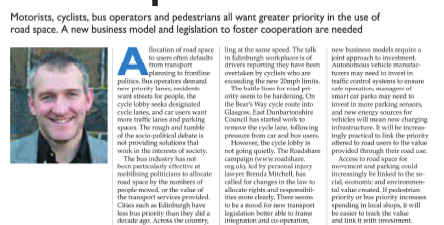New Frameworks are Needed for Sharing Roadspace
The rough and tumble of the socio-political debate is not delivering road sharing solutions that work in the interests of society. Politicians caught in the front line of complex road sharing decisions manage the pressure by fire fighting. New more effective apporoaches are needed to ensure that roads, as a valuable social asset are used socially. In my recent article in Transport Times I suggest that roads can become a platform for shared transport delivery.
Sometimes the greatest value comes from moving people and goods faster, and in other situations restrictions on road use can deliver greater value. Attractive streets such as in home zones have higher house prices, as do places served by efficient public transport. Priority over road use must account for all of these issues. With a new layer of complexity being added by technology, a new business model is needed where public authorities have a better chance of setting the agenda than simply responding to crises.
Autonomous vehicle manufacturers may need to invest in traffic control systems to ensure safe operation, smart parking managers may need to invest in more parking sensors and new energy sources for vehicles will need new charging infrastructure. With a new business model it could increasingly practical to link the priority offered to road users to the value delivered through their road use. Access to road space for movement and parking could increasingly be linked to the social, economic and environmental value created. If pedestrian priority or bus priority increases spending in local shops, it will be easier to track the value and link it with investment.
Social insurance could be one way to share the risks and rewards. A requirement for vehicles that cause congestion to carry insurance to fund projects to fix congestion problems could provide the foundations of a new business model. Clear road policy goals with measurable and verifiable outcomes can be used to allocate rights and responsibilities. Road sharing policies can be set by government, but day to day management requires an approach which is better able to stand back from the churn of day to day politics.
